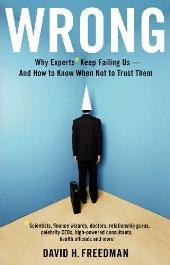
Wrong: Why experts keep failing us–and how to know when not to trust them
by David H. Freedman
–Reviewed by Adam Fleisher
 The promise that something as ordinary as coffee or red wine can do something extraordinary – extend your lifespan, make you smarter – is hard to resist. But David H. Freedman thinks such wisdom, along with all the other tidbits proffered by scientists, business gurus, and various other experts, should be ignored. As he puts it, “expert wisdom usually turns out to be at best highly contested and ephemeral, and at worst flat-out wrong.”
The promise that something as ordinary as coffee or red wine can do something extraordinary – extend your lifespan, make you smarter – is hard to resist. But David H. Freedman thinks such wisdom, along with all the other tidbits proffered by scientists, business gurus, and various other experts, should be ignored. As he puts it, “expert wisdom usually turns out to be at best highly contested and ephemeral, and at worst flat-out wrong.”
Freedman, a journalist with Inc. magazine, thinks we put too much trust in the cult of the expert. His prime target is the headline-grabbing, life-changing research finding. Freedman explains that scientists can be tempted to go beyond what the available data can really tell them, while “less formal experts” are particularly prone to “corruption and fraud” for the sake of career success. Peer review is no panacea because it subjects studies to “the whims of potentially cranky, biased, self-serving, agenda-wielding reviewers.” It’s a real problem that top scientific journals have such a profound imprimatur of legitimacy, because that creates intense competition to get into them, which in turn creates a bias toward exciting results that might not be replicable or even as definitive as they seem.
The grand enabler for the exciting study is the media, which publicize studies and popularize gurus and other so-called experts. Most consumers absorb expert information from television, and they tend to be willing to accept rather outlandish suggestions under the guise of expertise. Freedman blames the media for making scientific studies seem more accurate and reliable than they actually are in order to attract eyeballs. And in turn, simplifying and sensationalizing science influences the way studies are conducted – and the goals of researchers – since everybody knows what winds up on the front page.
Wrong offers ample advice on how to watch out for bad information. Freedman suggests we be “extra wary” of information that is “simplistic, universal, and definitive.” Provocative findings, such as claims that “fat can be good for you,” are to be avoided as well, in favor of conclusions that have been gradually accepted over time. And real expertise, he says, has too many qualifications, countervailing evidence, context and perspective to be translated into a nugget of advice. That is, expertise is not really advice.
Freedman knows better than to insult his potential audience, and so he doesn’t dwell on the fact that the real problem with experts seem to be mostly on the demand side. Wrong suggests we take as trustworthy advice negative findings, such as that coffee doesn’t prevent Alzheimer’s. But knowing that doesn’t especially help anyone. The advice Freedman is attacking is the stuff that people actually want. And the expertise Freedman attacks is really the popularization of supposed study and analysis – the blandishments emanating from self-styled experts like Donald Trump and the pastor/life coach Joel Osteen. And as those two examples show, pseudo-expertise is good business.
To his credit, Freedman concludes with a recitation of how Wrong might be wrong. He concedes to bias, and accepts that he’s probably “artfully selected facts and concepts” to make his case. Still, he doesn’t concede on his title, even as he makes the much more modest claim that there is substantial evidence “to suspect that most experts are usually wrong.”
Excerpt: “Highly resonant advice isn’t always benign, though, particularly when serious health issues and large financial investments may be involved. When the television financial guru Jim Cramer makes enthusiastic but wildly erratic market predictions, people can lose their life savings. And when the actress Jenny McCarthy describes in a bestselling book, on the talk-show circuit, and on the Internet how her child “recovered” from autism through diet and alternative medical treatments, she is inflicting highly dubious advice on vulnerable parents, with the possible result that children may be deprived of urgently needed effective therapies.”
Further Reading: Blunder: Why Smart People Make Bad Decisions by Zachary Shore and The Upside of Irrationality: The Unexpected Benefits of Defying Logic at Work and at Home
by Dan Ariely
Adam Fleisher is a law student at the University of Virginia.
*Photo courtesy Ira.




Send A Letter To the Editors